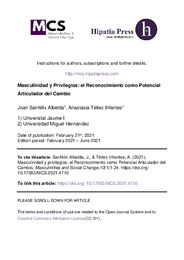Por favor, use este identificador para citar o enlazar este ítem:
https://hdl.handle.net/11000/31223Registro completo de metadatos
| Campo DC | Valor | Lengua/Idioma |
|---|---|---|
| dc.contributor.author | Sanfélix Albelda, Joan | - |
| dc.contributor.author | Téllez Infantes, Anastasia | - |
| dc.contributor.other | Departamentos de la UMH::Ciencias Sociales y Humanas | es_ES |
| dc.date.accessioned | 2024-02-07T13:34:38Z | - |
| dc.date.available | 2024-02-07T13:34:38Z | - |
| dc.date.created | 2021-02 | - |
| dc.identifier.citation | Masculinites and Social Change (MSC) Vol. 10, Nº. 1, 2021 | es_ES |
| dc.identifier.issn | 2014-3605 | - |
| dc.identifier.uri | https://hdl.handle.net/11000/31223 | - |
| dc.description.abstract | The article that is presented next analyse discursively the perception that men have about their advantage situation or privilege (the patriarchal dividends in words of Raewyn Connell, 1995) as a man and in a domination system such as patriarchy (in its current times). It is thought from the theory and from an empiric approach how privilege is denied or recognised using different mechanisms of social research through that can emerge some form of recognition of it. In other words, how we can tackle the complexity of this object from a technic-methodologic point of view and what kind of tools is offering us socio-anthropology, such as the biographic interviews for instance, as this technique facilitate the generation of a communicative situation where particular implicit forms of privilege recognition could appear discursively. The analysis also focuses in how it could facilitate a breaking principle with the traditional model of masculinity characteristic of hegemonic ideological representations of gender, facilitating in this way the construction of alternative masculinities more equalitarian. | es_ES |
| dc.description.abstract | El artículo que se presenta a continuación analiza discursivamente la percepción que los hombres tienen acerca de su situación de ventaja o privilegio (los dividendos patriarcales según Raewyn Connell, 1995) en tanto que varones y en un sistema de dominación como el patriarcado (en su momento actual). Se reflexiona desde la teoría y la empiria sobre su negación o reconocimiento y los mecanismos de investigación a través de los cuales podemos acceder a estas ideas y relatos en relación con los privilegios masculinos en los varones. Desde un punto de vista técnico-metodológico abordamos la complejidad de acceder a este tipo de conocimiento y algunas de las herramientas que desde la socio antropología se ofrecen, entre otras, las entrevistas biográficas, puesto que estas facilitan la generación de una situación comunicativa donde emergen discursivamente ciertas formas implícitas de reconocimiento del privilegio. El análisis incide en cómo esto puede favorecer un principio de ruptura con el modelo tradicional de masculinidad propio de las representaciones ideológicas hegemónicas de género, facilitando así la construcción de masculinidades alternativas más igualitarias. | es_ES |
| dc.format | application/pdf | es_ES |
| dc.format.extent | 25 | es_ES |
| dc.language.iso | spa | es_ES |
| dc.publisher | Hipatia Press | es_ES |
| dc.rights | info:eu-repo/semantics/openAccess | es_ES |
| dc.rights | Attribution-NonCommercial-NoDerivatives 4.0 Internacional | * |
| dc.rights.uri | http://creativecommons.org/licenses/by-nc-nd/4.0/ | * |
| dc.subject | masculinity | es_ES |
| dc.subject | privilege | es_ES |
| dc.subject | patriarchy | es_ES |
| dc.subject | biographic interviews | es_ES |
| dc.subject | masculinidad | es_ES |
| dc.subject | privilegio | es_ES |
| dc.subject | patriarcado | es_ES |
| dc.subject | entrevistas biográficas | es_ES |
| dc.subject.other | CDU:572 - Antropología | es_ES |
| dc.title | Masculinidad y privilegios: el reconocimiento como potencial articulador del cambio | es_ES |
| dc.title.alternative | Masculinity and Privileges: Acknowledge as a Potencial Articulator of Change | es_ES |
| dc.type | info:eu-repo/semantics/article | es_ES |
| dc.relation.publisherversion | https://doi.org/10.17583/mcs.2021.4710 | es_ES |

Ver/Abrir:
Artículo Sanfélix y Téllez 2021 (1).pdf
397,65 kB
Adobe PDF
Compartir:
 La licencia se describe como: Atribución-NonComercial-NoDerivada 4.0 Internacional.
La licencia se describe como: Atribución-NonComercial-NoDerivada 4.0 Internacional.
.png)